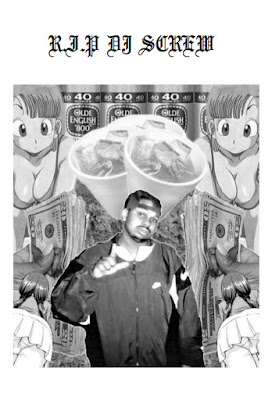TOWN BUSINESS: THE TRUE IMPORTANCE OF DJ SCREW’S GRAY TAPES
TOWN BUSINESS: THE TRUE IMPORTANCE OF DJ SCREW’S GRAY TAPES By Dafydd McKaharay
(From Thee Krypteia No.2 2017)
Anyone who has made compiled 90 minutes worth of songs to impress a lad or lass they like knows the import of the mixtape. Far more than a promotional tool, or a DJ showcase, the magic of the mixtape is the fact that it conveys a message in a very unique way. Just like the DJ mix that it imitates, its power is its ability to create a singular message from the sum of many parts. A collection of songs that joins forces to tell one story. It is easy to get lost in the obvious mystique of DJ Screw’s legendary “Gray Tapes”. The hypnotic, slow tempo often draws one into a narcosis, only heightened by the generational hiss and sibilance unintentionally created by both the process of slowing the music down and the archival limitations of Screw’s choice of 100 Minute Hi Bias Metal Maxell. It is, indeed, this psychedelia that made Robert Earl Davis Jr. famous as an innovator. What many may not know outside of the Screwhead circle is that Davis is revered as “the Orginator” not simply because of his sonic somnambulism, but because of his place as a community leader. The true importance of a DJ Screw tape is in its document of Southside Houston during the 1990s. Locals, both artists and residents alike, credit him with the unification of Houston hip hop. Some even go further to extend his ambassadorship to Texas and the entire Southern region of the USA. His tapes were some of the first to showcase Southern rap, many unheard local artists, side to side with the G Funk classics that occupied much of the playlists of DJs at the time. The slow tempo also helped to cut through thick southern accents that often kept these artists from gaining recognition for their creativity and lyricism. Like Too $hort and Freddy B in Oakland, his tapes also gave birth to an entire cottage industry of parking lot tapes, sold out of trunks all over the “great state of Texas”. Even deeper though, a Screw mix, known to fans as a “Gray Tape” (due to the color of those 100 Minute Maxells) acts almost as a Town Hall Meeting. Many of his tapes were commissioned and created to commemorate specific events in the Southside Houston community. Birthdays, graduations, and births were all celebrated. Perhaps his most famous tape, “June 27th” was recorded at a party for his friend DeMo’s birthday. “9 Months Later” was a commissioned tribute to the birth of a friend’s child. “One Life to Live” is the recorded celebration of rapper E.S.G.’s release from jail and “Off Parole” celebrates the day Skinny Shaun finally got off papers. “No Drank” documents a codeine drought. Even personal triumphs are documented in these tapes. The cult favorite “Leanin’ on a Switch” was commissioned to commemorate the day Big Pokey finally got hydraulics on his car. This author would be hard pressed to think of any other DJ whose mixes so genuinely and comprehensively document an entire community the way DJ Screw’s tapes do. The mixes themselves were often the result of all night party sessions. Edited later, many of Screw’s tapes feature a narrator, often a member of the Screwed Up Click, or S.U.C. This loose collective of rappers in itself is a testament to the unifying force of Screw, as it included not just local gangbangers, but auto mechanics, barbers and “9 to 5” businessmen who all gathered at Screw’s apartment at night to smoke, lean and create some of the most important American music in the late 20th Century. Anyone who has listened to a tape knows that the best Gray Tapes revolve around long freestyle sessions, where one can hear the microphone physically be passed from emcee to emcee. Often, non-rapping members of the party are cajoled into brief freestlyes. Throughout the tapes, the aforementioned narrator often sets the scene and helps explain the environment. He announces guests as they enter and leave, critiques the artists on their performances and lets people know when more party supplies have arrived. More than just a novelty, Screw’s tapes are a glimpse into 1990’s American Inner City Life in a way no film or novel can impart. Unscripted and honest, they are a testament to the power of cassette culture.




Comments
Post a Comment